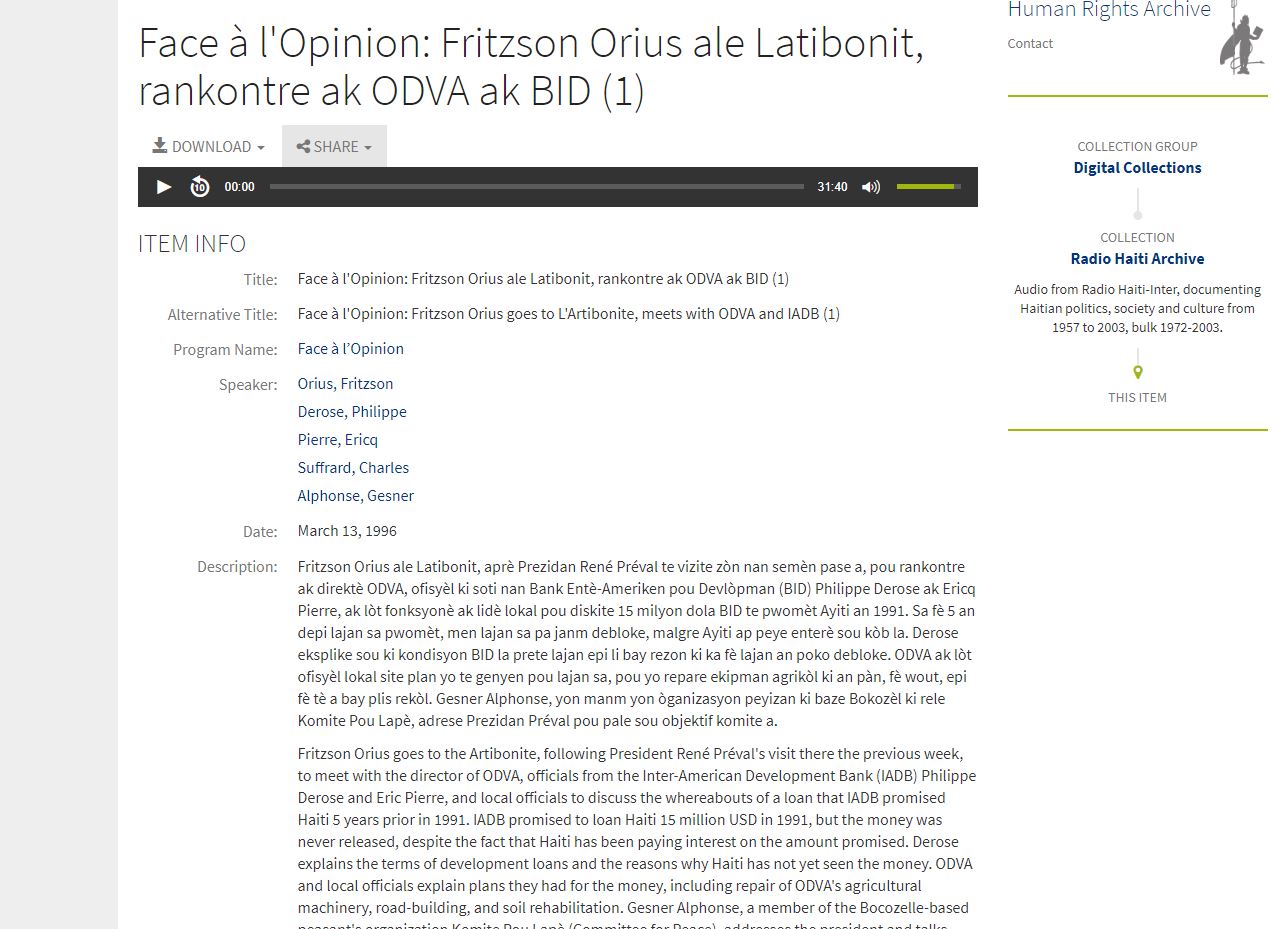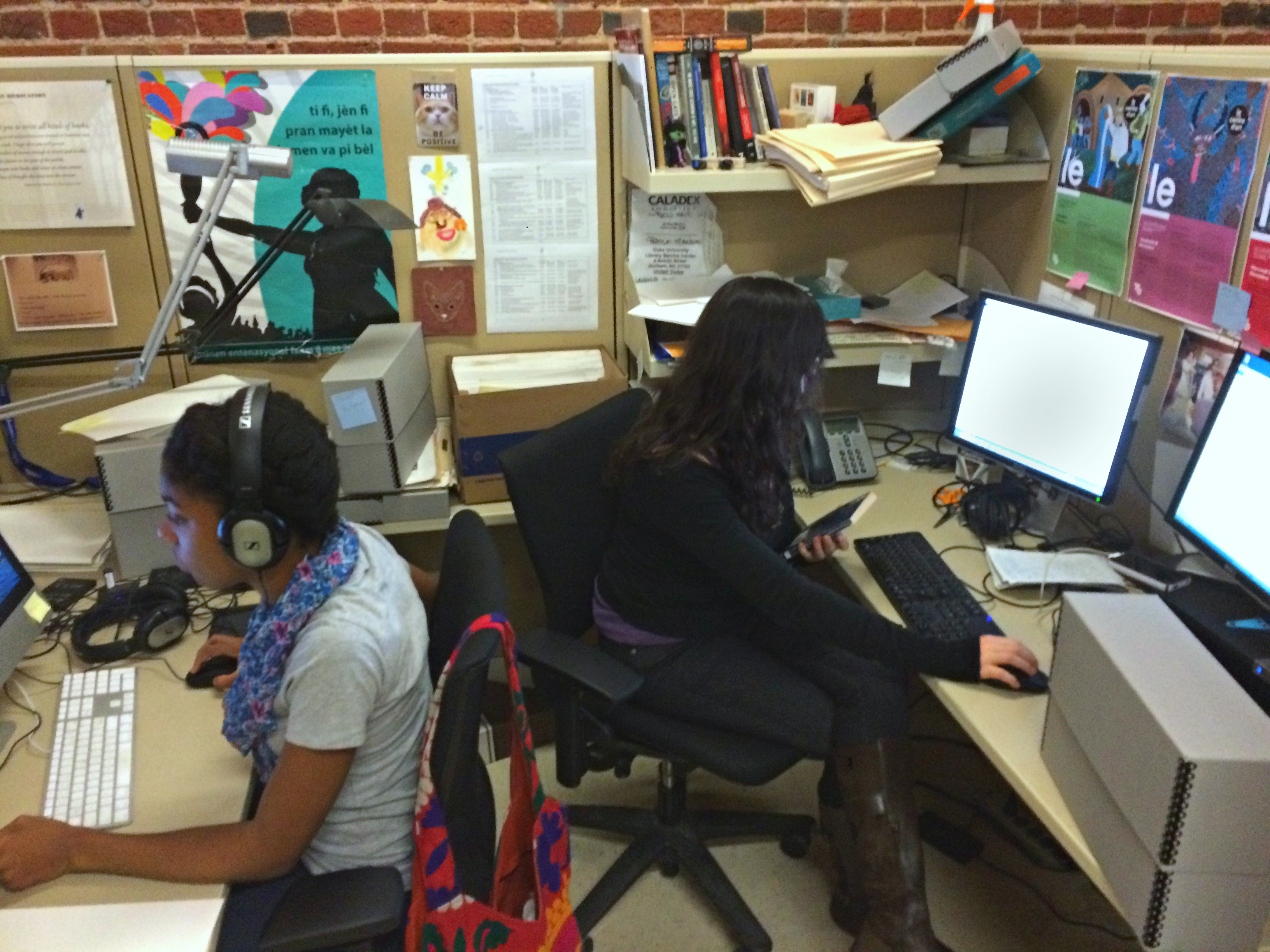Post contributed by Tanya Thomas, Radio Haiti Student Assistant

As a Haitian-American raised in Miramar, FL and Petit-Goâve, Haiti, moving to Durham, NC in 2013 for my freshman year at Duke was a culture shock. For one thing, I learned the hard way that ordering patties from a restaurant menu meant getting the ground beef portion of a burger, not a deliciously deep-fried, meat-filled Caribbean staple. As I began to settle into life at Duke and in Durham as a pre-med student majoring in International Comparative Studies with a focus on Latin America and the Caribbean, I started working on the Rubenstein Library’s Radio Haiti Archive project. The main part of my job was to listen to interviews from Haiti’s first independent radio station, Radio Haiti-Inter, a station that ran from the early 1970s to 2003, finally closing a few years after the assassination in spring 2000 of the station’s director, the agronomist-turned-journalist Jean Dominique. Working on the Radio Haiti project was my work-study job, but the job meant so much more to my Duke experience than extra cash. It gave me the opportunity to explore and understand the history of my homeland, which is why when I graduated in 2017, I wanted to keep working on the project, even while applying to medical school and working as a medical scribe in Miami.

As an assistant for the Radio Haiti Archive, part of what I do is listen to Jean Dominique’s daily Face à l’Opinon interviews. I then describe these interviews in English and Haitian Creole so that anyone, from academics who study Haitian history to someone curious about twentieth century Haitian life, can browse and learn. I tag the relevant topic, place, and name labels to go with the descriptions. What made Radio Haiti special was the fact that Jean Dominique interviewed peasant farmers and grassroots activists just as often as he did political leaders and members of the intellectual and economic elite. It’s one thing for a renowned journalist to interview a member of parliament about how a policy affects peasants. It’s another to interview a rice farmer and local activist about how government organizations are actually impacting their livelihoods. No social position was too small to be heard on Radio Haiti. Listening to hundreds of these interviews helped me gain skills and insights that I will use moving forward as a doctor who aims to provide care to underserved populations.

As a medical scribe, I work in the consult room as the patient is being seen by the doctor. I listen to their health concerns in real-time and type their symptoms and relevant information about their life circumstances into their electronic medical record. In the summarizing sections of the notes, I condense the entire visit to the patient’s most pressing symptoms. I also record what the doctor tells me that she or he finds during the physical examination, and the treatment plan they decided on with the patient. I write these notes not only for the doctor’s own reference, but also for anyone with access to the patient’s record. For example, this could be a paramedic taking a seriously ill patient to the hospital, or a judge in a court of law if the visit were to come up in a medical malpractice lawsuit.
In that respect, medically scribing a patient encounter is quite like describing Radio Haiti recordings. In both these jobs, my notes must be clear enough to lay out the situation so that someone reading what I wrote for the first time can be caught up enough to know what the most pressing thing that happened was, and what related issues can be investigated for further context. Though I am a subjective human being, I must faithfully and dispassionately communicate what happened and who said it with as little subjective input as possible. Whether listening to descriptions of injustice and human rights violations in the Radio Haiti materials, or creating a record of the pain and suffering of a patient in the clinic, it can be difficult to keep my emotions from clouding my understanding of events, but critical distance remains crucial to the work at hand. Moreover, the patients we served in the Miami clinic were, like many of the people Jean Dominique interviewed at Radio Haiti, people who are excluded from the political process or silenced in clinical encounters: immigrants, undocumented people, people who do not speak English, and poor people. I have learned to balance the processing of personal information with the larger social responsibility of providing a service to the marginalized, and this skill is something I will keep nurturing throughout medical school and beyond. As I reflect on this past year and prepare to start medical school this month, I realize that by working as a medical scribe and an assistant for the Radio Haiti Archive the most important skill I have learned this year has been listening. As one of Radio Haiti’s old jingles went, “Radyo Ayiti: anvan nou pale, nou koute w!” (“Radio Haiti: before we speak, we listen to you!”)
The Rubenstein Library staff, and particularly the Radio Haiti team (Laura Wagner, Craig Breaden, Patrick Stawski, Sarah Schmidt, and Naomi Nelson) would like to congratulate Tanya on starting medical school at the University of Miami Miller School of Medicine this week! We are proud of you, we appreciate everything you’ve done for this project, and we wish you bon chans as you undertake this next exciting step.
The processing of the Radio Haiti Archive and the Radio Haiti Archive digital collection were made possible through grants from the National Endowment for the Humanities.


